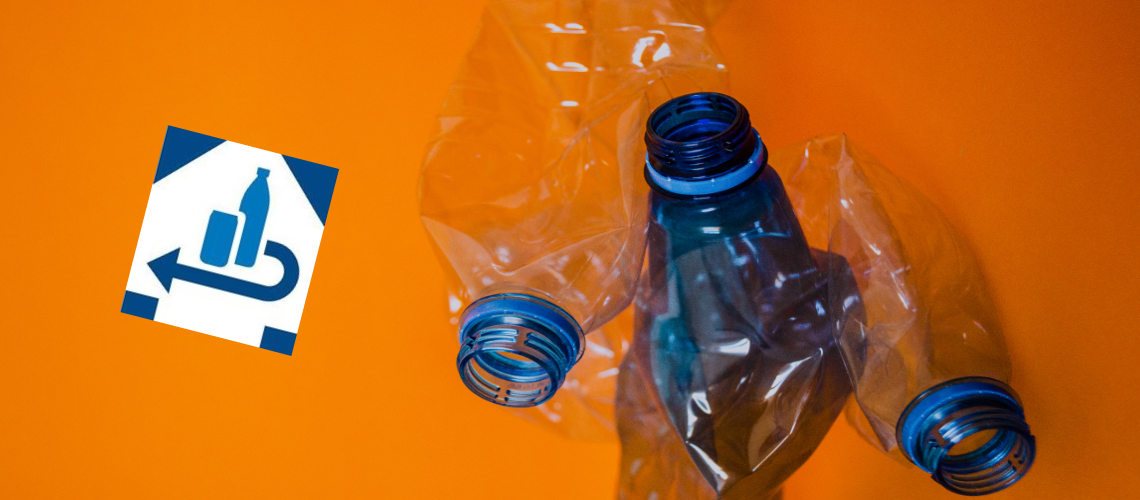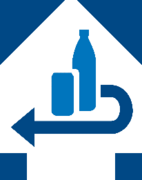
Pfandsystem: The German Deposit-Refund System
Have you ever seen the symbol above? This symbol is the sign for the German deposit system. For certain types of packaging (e.g. glass & plastic bottles and aluminum cans), you are charged a few cents more at the cash register, which you get back when returning them.
💡 What is the Pfandsystem?
The idea behind this system is to produce less waste and make it possible to recycle a lot of packaging. If you buy water, beer or soft drinks in disposable bottles in a German supermarket, convenience store or at a gas station, you automatically pay a little more than it is indicated on the price tag. This is called “mandatory deposit system” or “Pfandpflicht” in German. However, not every packaging fall under this rule; bottles with a capacity of less than 0.1 liter and more than three liters, as well as dairy products, fruit juices, spirits and cartons are exempt from this mandatory deposit.
What does "Pfand" (deposit) actually mean? The deposit, in a general sense, a thing or a sum of money that I give to an institution or person to whom I owe something. So a material or financial security (sometimes an object). Once you pay your debt, return the loan, or fulfill your part of the bargain, you get the deposit back. The bottle deposit works on the same principle. It is an amount of money that you pay for the bottle, when you return the bottle, you also get back the deposit you paid.
When the bottles are empty (they are called " Leergut"), you can take them back to any supermarket, convenience store or gas station. There are automated machines that take back the bottles. The computer reads the label of the bottle and you get a voucher with credit. This voucher can be redeemed for cash at the checkout or for the next purchase.
In the Einwegpfandsystem (one-way deposit system), the returned packaging is sorted, washed, crushed into granules to be pressed into new packaging. Einwegpfandsystem - phew that is a long word. “Einweg” means one-way; you can only use it once.
There is also the Mehrwegpfandsystem (reusable deposit system). Here, the packaging is sorted, washed and refilled directly. The reusable deposit system is not regulated by law. It is based on a voluntary closed-loop system between manufacturers and retailers.
🔍 How can I recognize a deposit bottle?
💶 How much is the deposit?
| Einwegpfand (One-way deposit) | 25 Cent |
| Mehrwegpfand (reusable deposit system) | |
| Beer bottles made of glass | 8 Cent |
| Beer bottles with swing top | 15 Cent |
| Water bottles (glass or PET9 | 15 Cent |
| Juice or soft drink bottles | 15 Cent |
| Wine bottles | 2 or 3 Cent |
| Case | 1,50 Euro |
| Half beer case | 75 Cent |
👍 Advantages of the deposit system
Customers receive money when they return their deposit bottles. This motivates most people not to simply throw the bottles on the ground, leave them in parks or pollute other public ground. 99% of the deposit bottles are returned.
Originally, it was hoped that the deposit would lead to people buying less disposable packaging. That would of course be a great advantage. Unfortunately, that has not been the case. Consumption of disposable packaging has actually increased.
For the environment, the glass bottle is always best. Glass can be reused the most frequently and thus is the most sustainable for the environment.
🤭 Fun Fact
Der oder das Pfand?
"Pfand" is a German word where even the Germans are not sure which article is correct.
According to the Duden, " Pfand" is a neutral noun. The correct article is therefore "das". However, according to a survey by the YouGov polling institute, 28% of Germans say "der Pfand.
💬 Important vocabulary:
- Die Pfandflasche (the deposit bottle)
- Der Pfandflaschenautomat (the deposit bottle machine)
- Ein Pfand abgeben (returning a refundable deposit)
- Pfand für etwas bezahlen (to pay a deposit for something)
- Ist auf dieser Flasche Pfand? (is there a deposit on this bottle?)
👉🏽 Find out more information about our German Courses on our Website


